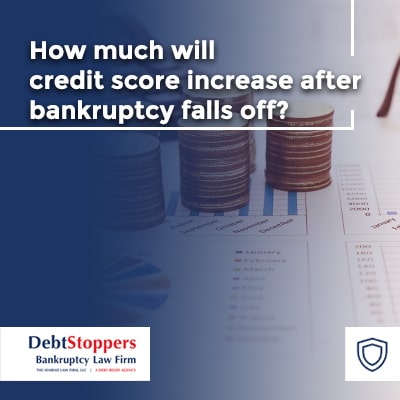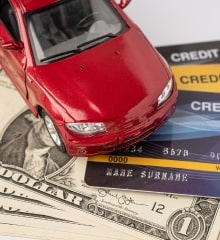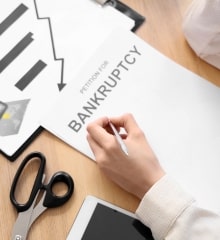Common Questions About Credit Score After Bankruptcy

People who file bankruptcy are often concerned about their credit scores. It’s important to remember that your credit score is not permanent and with consistent effort, you can improve your score. Time will pass, and if you have a plan and are mindful about credit and debt following bankruptcy you can rebuild your credit score after bankruptcy.
What will my credit score be after bankruptcy?
Many people who file bankruptcy have a history of negative events on their credit reports. So while it is true that filing bankruptcy will negatively impact your credit score, it’s also important to remember that if you can successfully discharge your debt through bankruptcy and get a fresh start, you can rebuild your credit history and repair your credit score.
Bankruptcy does have an immediate negative impact on your credit score. The amount of the decrease largely depends on your credit score before bankruptcy. Typically, the higher the credit score, the larger the decrease. For example, someone with a credit score of 680 will likely experience a larger drop than someone with a credit score of 500 before filing bankruptcy. The negative impact can range from 120 to 200 points or more.
If you are worried because your credit score is already lower than you’d like, it’s important to remember that the lower your score is, the less of a drop.
However, it’s important to know that the impact of the negative event will decrease over time, so if you are mindful of your future credit use, you can begin to move forward and rebuild your credit history.
How soon will my credit score improve after bankruptcy?
You can start to improve your credit score immediately. For many of our clients who haven’t been able to pay their debt for years, their credit scores are already in the tank. As soon as they file bankruptcy and discharge their debt, halt wage garnishment, stop a foreclosure or repossession, they can quickly get back on their feet.
While your credit score may drop immediately after filing bankruptcy, the discharge of debt can actually improve your overall report since it removes and closes accounts that currently have a negative impact. Simply put, you don’t have to wait until the bankruptcy falls off your credit report to start rebuilding your credit. Bankruptcy iis not just another negative mark on your record, it is the beginning of your efforts to repair and rebuild your credit history.
How to improve credit score after bankruptcy effectively?
After you’ve filed for bankruptcy, the negative event will be reflected on your credit history, but it’s important to remember that your credit score is simply a snapshot of a point in time. Once you’re able to discharge your debt, you’ll have the money to pay your bills again.
Simply put, you can start to improve your immediately if you are mindful of your budget and future credit use. You can start by creating a budget that is realistic - include all of your income and expenses. You should consider your budget a living document that you revisit and update often. Make sure you understand where your money is going.
Be sure to pay your remaining debt on time. Late and missed payments will further deteriorate your credit score. You should also be mindful of taking out new lines of credit. If you are unable to access credit through traditional means, you can start with a secured credit card or a company that offers credit to people with less-than-perfect credit history. These lines of credit may come with less generous terms than traditional credit cards, but if you pay off your balance each month, you’ll rebuild your credit history and repair your credit score.

How much will credit score increase after bankruptcy falls off?
Chapter 13 bankruptcy will be removed from your credit score after 7 years, and Chapter 7 will fall off after 10 years. Once that happens, your credit score may increase should improve by 30 to 100 points, depending on your credit history and financial behavior.
The increase you’ll see in your credit score is largely based on your debt-to-income ratio and your efforts to rebuild your credit after filing bankruptcy. It’s especially important that there are not additional negative marks on your recent credit history. With consistent effort, you can see a drastic improvement as soon as the bankruptcy falls off your credit report.
What factors shape your credit score after bankruptcy?
The main factors that shape your credit score after bankruptcy are limiting your credit usage and ensuring you make all remaining payments on time.
Late and missed payments can have a huge impact on your score. In fact, your payment history makes up 35% of your credit score calculation. With consistent effort, you can demonstrate a good payment history and repair your credit score.
Can you buy a home with your credit score after bankruptcy?
Yes, you can buy a home after bankruptcy. However, you should be prepared for a waiting period that depends on what type of bankruptcy you filed and what type of home loan you are seeking. During the waiting period, you can work on rebuilding your credit and finances so when you’re eligible, you’ll be in a strong position.

How does chapter 7 vs chapter 13 affect credit score after bankruptcy?
Chapter 7 will remain on your credit report for ten years, while Chapter 13 will remain on your credit report for seven years.
Chapter 7 may have a larger immediate impact on your score but, by discharging your unsecured debt, you’ll have money to pay your bills and rebuild your credit.
Chapter 13 includes a repayment period of three to five years and typically involves repaying more of your debt, which is viewed somewhat more favorably by creditors.
What myths exist about credit score after bankruptcy?
The biggest myth about credit scores after bankruptcy is that your credit will be ruined forever. That could not be further from the truth. The truth is that bankruptcy is a catalyst to a fresh financial start. Once the bankruptcy petition is filed, you can immediately begin rebuilding your credit score. As the negative debts are removed, your score will improve. Once your debts are ultimately discharged, you’ll have money to pay your bills. You’ll find that if you are consistent and mindful, you can repair your credit and improve your credit score.





